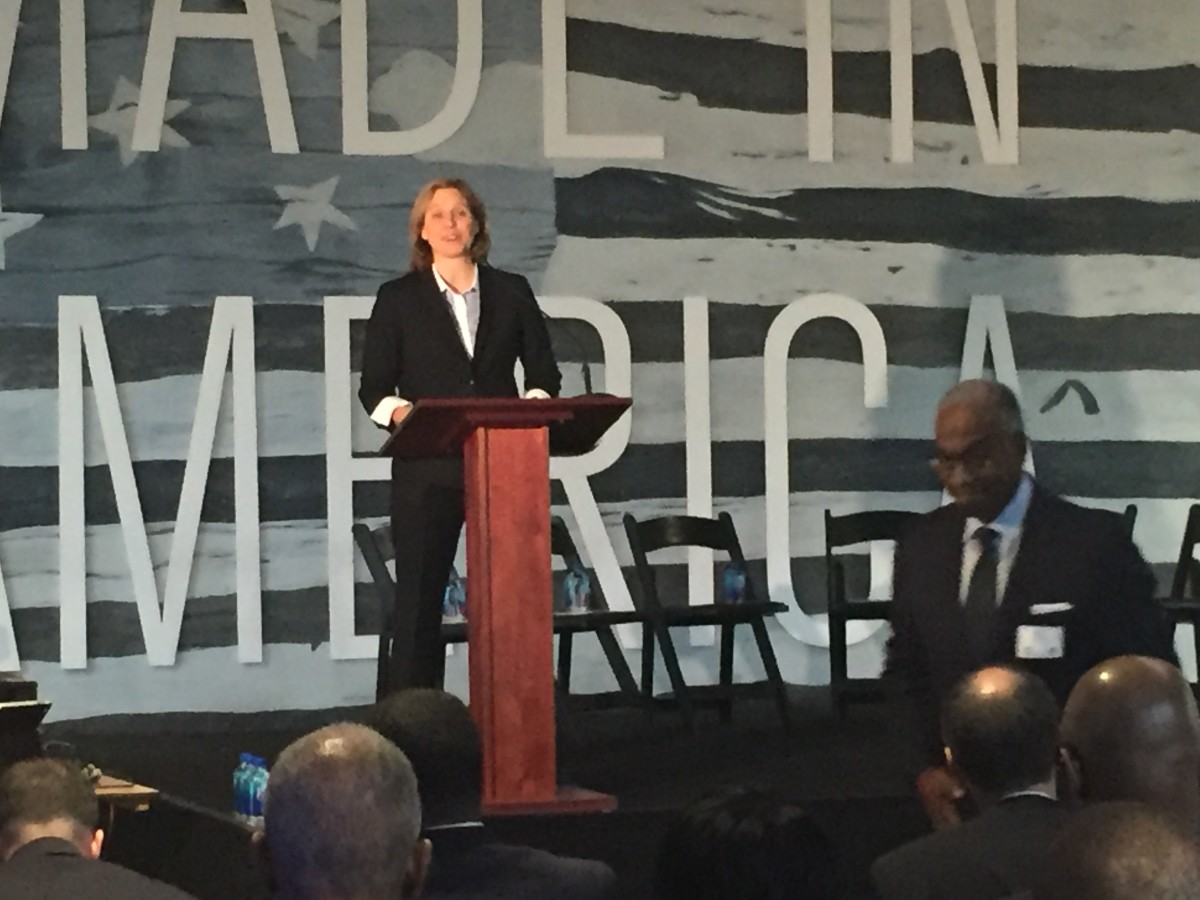Senior Obama administration officials were at City Garage Tuesday morning to add Baltimore to the list of cities in the White House’s TechHire program.
Baltimore joined about three dozen other areas to join what U.S. CTO Megan Smith called the “TechHire community,” which is aimed at increasing opportunities for training and job placement in tech jobs. The Obama administration established the initiative in response to the 500,000 unfilled jobs in fields like cybersecurity, IT and software development.
Smith, a former Google exec who last visited Baltimore over the summer, said TechHire has a focus on low-income communities, which will work specifically in Baltimore.
“How is it that within a couple miles we’ve got Americans going to Pluto and Americans in the lowest [income] mobility?” Smith said to a big crowd of business, tech and civic leaders at City Garage. “We’ve got to change that.”
As part of this new membership, Baltimore companies and organizations are eligible to participate in a $100 million grant competition, which U.S. Secretary of Labor Thomas Perez said would focus on bootcamp-style training programs, and hiring or training programs that use data or other innovative methods.
“These grants are not about ‘train and pray,'” he said. Instead, it’s about “finishing training on Friday, and starting work on Monday,” Perez sad. The grant applications for about 35 spots just went live on Tuesday.
Apply
A separate $20 million grant competition will focus specifically on job training for former offenders. “We must do re-entry at scale if we are to succeed,” he said. Initially, 14 grants will be awarded.
Apply
In addition to money, the TechHire program aims to urge cities to commit to developing more tech training. In Baltimore, the initiative will be run through OneBaltimore, the public-private partnership that formed as a response to the death of Freddie Gray and the violent unrest that followed his funeral. To date, OneBaltimore’s main public initiatives have been focused around expanding tech in underserved communities, with a donation of 1,000 laptops to school and community partners being the other major effort.

Seated: Plank Industries’ Demian Costa, Betamore CEO Jen Meyer, ETC President Deb Tillett, BGE CEO Calvin Butler. (Photo by Stephen Babcock)
OneBaltimore will form a TechHire Council, which is set to include organizations like the mayor’s office, Greater Baltimore Urban League, Code in the Schools, Betamore, the Center for Urban Families and Goodwill.
On the business side, White House literature named Verizon, Browns Communications, Delmock Technology, G&G Solutions, Locas Technology, Digit All Systems, Intellibit, SeeFuture, Microsoft and Bithgroup Technologies as “employer partners.”
Michael Cryor, who chairs OneBaltimore, said Baltimore has been a “siloed city” when it comes to efforts aimed at creating more jobs for underserved communities.
“What we’ve not had is a collaborative, structured ecosystem that puts it all together,” he said, adding that the city should act on TechHire’s call whether or not an organization gets a grant. The business community is a key component, Cryor said, both in terms of potential hiring and helping to create training that rises to the company’s standards.
“That’s the driver,” Cryor said. “When the business community says we’re going to do this, that makes me feel like we’ve got a real shot.”
And tech is a key point of growth for the business community.
During a panel that delved into how Baltimore would benefit from TechHire, Plank Industries’ Demian Costa said tech talent is more important to growing local companies than capital. BGE CEO Calvin Butler said technology training is key for employees of the energy company who “need to know how to use technology to service our customers.” Likewise, Emerging Technology Centers President Deb Tillett said Baltimore’s economic development agenda can move “from steel to startups.”
“Our startup companies are where the activity is,” she said. “That’s where the jobs are growing.”
Before you go...
Please consider supporting Technical.ly to keep our independent journalism strong. Unlike most business-focused media outlets, we don’t have a paywall. Instead, we count on your personal and organizational support.
3 ways to support our work:- Contribute to the Journalism Fund. Charitable giving ensures our information remains free and accessible for residents to discover workforce programs and entrepreneurship pathways. This includes philanthropic grants and individual tax-deductible donations from readers like you.
- Use our Preferred Partners. Our directory of vetted providers offers high-quality recommendations for services our readers need, and each referral supports our journalism.
- Use our services. If you need entrepreneurs and tech leaders to buy your services, are seeking technologists to hire or want more professionals to know about your ecosystem, Technical.ly has the biggest and most engaged audience in the mid-Atlantic. We help companies tell their stories and answer big questions to meet and serve our community.
Join our growing Slack community
Join 5,000 tech professionals and entrepreneurs in our community Slack today!

The person charged in the UnitedHealthcare CEO shooting had a ton of tech connections

From rejection to innovation: How I built a tool to beat AI hiring algorithms at their own game

Where are the country’s most vibrant tech and startup communities?




